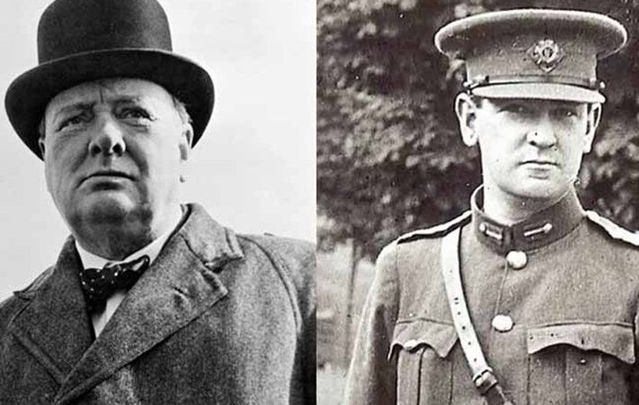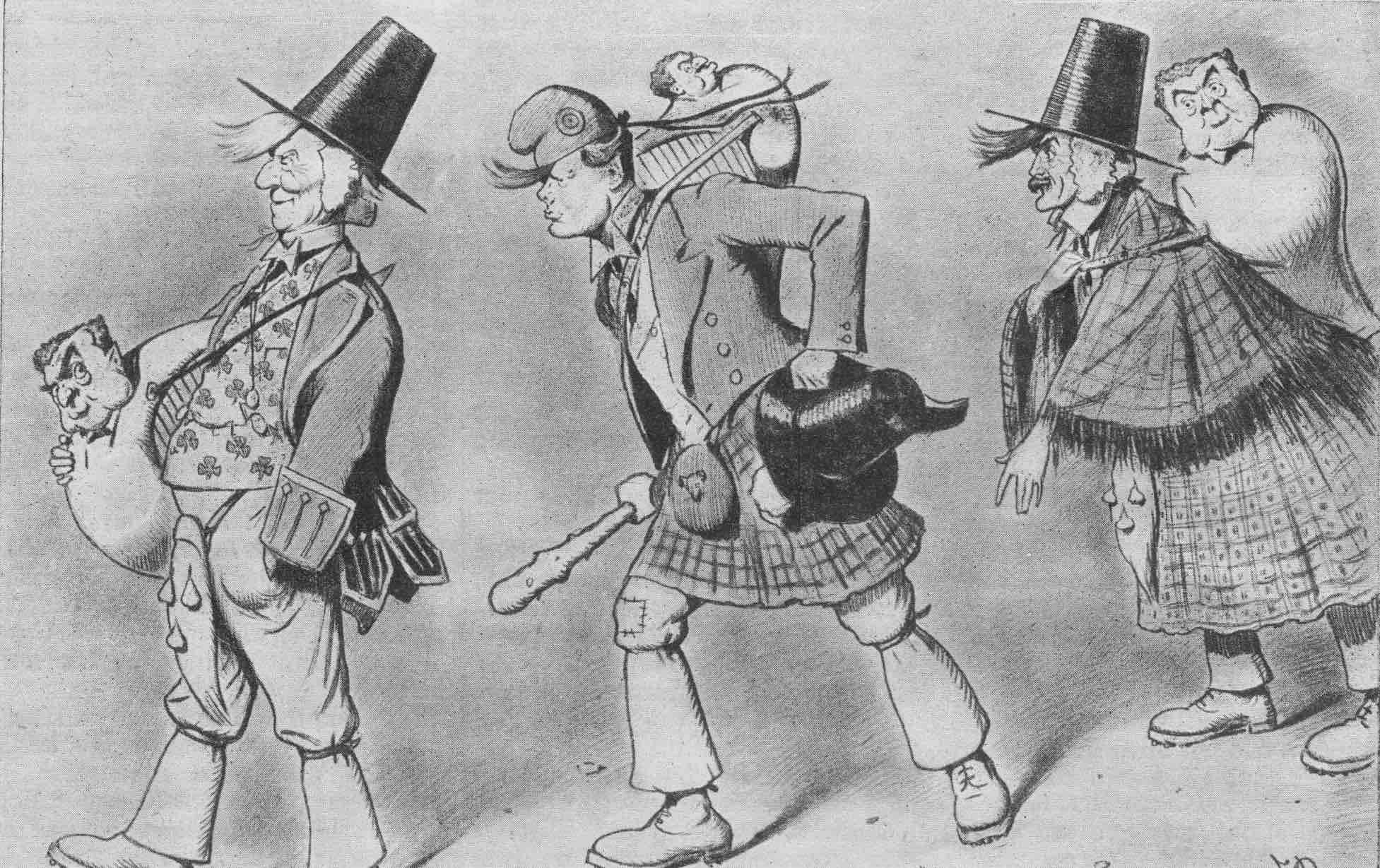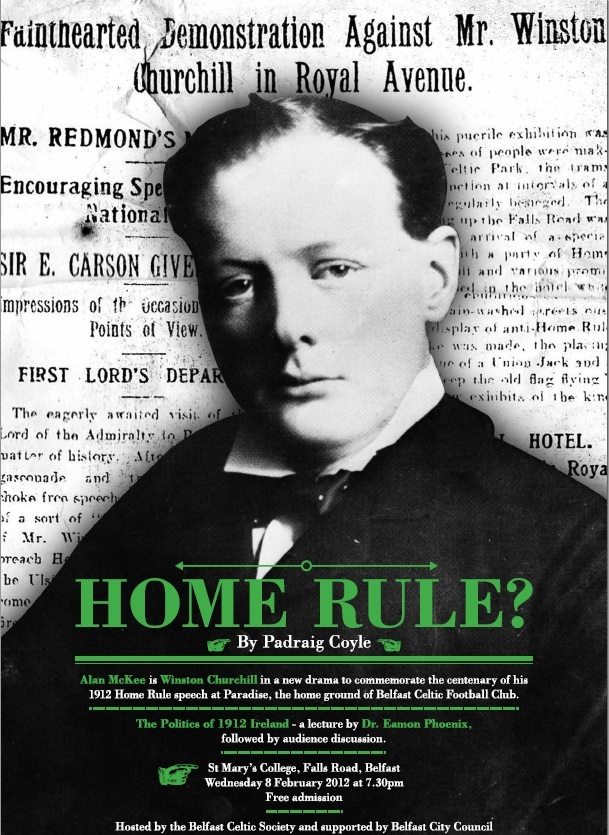
Lectures at Sea (2): Churchill and the Myths of Ireland
Myths Amid the Mists of Ireland
This is the Ireland portion of my lecture on the 2019 Hillsdale College Round-Britain cruise. Hillsdale cruises with “lectures at sea” are regular events. My book Winston Churchill: Myth and Reality considers tall tales, exaggerations, lies, myths, rumors and distortions about Churchill over the years. Nowadays, the old adage that you don’t speak ill of the dead is obsolete. It seems more important now to deconstruct history and puncture heroes. The tool is the Internet. Without straying from your keyboard, you can anonymously spout whatever nonsense occurs to you. The late Umberto Eco, the Italian writer and critic, nicely described this phenomenon: “Social media gives legions of idiots the right to speak when they once only spoke at a bar after a glass of wine, without harming the community….It’s the invasion of the idiots.”
The right of reply
Churchill, who won a Nobel Prize, and did a few other things, cannot reply. He lies at Bladon in English earth, “which in his finest hour he held inviolate.” He’d love the controversy he stirs today, on media he never dreamed of. He once said the vision “of middle-aged gentlemen who are my political opponents being in a state of uproar and fury is really quite exhilarating to me.”
N.B. Also covered in this talk were the myths that Churchill led the war party in 1914, that his negligence contributed to the sinking of the Titanic in 1912, and that he purposely directed the Lusitania into the path of a German U-boat in 1915. These subjects may be found by clicking the links above.

Our cruise around Britain related to many interesting Churchill myths. On a map I’ve labeled every place around the British Isles with a Churchill connection. If any suggest a question, please ask. For example, what does Churchill have to do with the Isle of Jura in the Hebrides (upper right)? No one has come up with it.
Dublin, Waterford and Redmond
Monday 10 June brought us to Dublin, where Winston Churchill had his first childhood memories. The next day was Waterford. Most came there for the crystal, but we hoped to see where John Redmond was sworn in. Redmond represented Waterford for the Irish Parliamentary Party for nearly thirty years, and his son after him. Waterford was one of the few constituencies outside Ulster not won by Sinn Féin in the 1918 election.
In the debate over Irish Home Rule Redmond, like Churchill, favored moderation, conciliation and Irish autonomy. Many years later in the Commons, Churchill said:
I always bear in my memory, with regard, John Redmond…of the old Irish Parliamentary Party, which fought us for so many years in this House, pleading the cause of Ireland, with great eloquence and Parliamentary renown…making these speeches of absolute support and unity with this country until everybody said everywhere, “The brightest spot in the world is Ireland.”
“The Minstrel Boy”
Here is a rather rude cartoon, in Punch, 1910, of the Liberal lions, Asquith, Churchill and Lloyd George, each with John Redmond “in the bag.” Churchill is “the Ministerial Boy with his wild harp slung behind him.” In a more literate age, everyone recognized the words. They are from “The Minstrel Boy,” Thomas Moore’s lovely, haunting song of the 1798 Irish rebellion…
The Minstrel fell but the foeman’s chain
Could not bring his proud soul under
The harp he loved ne’er spoke again
For his tore its chords asunder….
Thy songs were made for the pure and free
They shall never sound in slav’ry.
“Thy songs were made for the pure and free … They shall never sound in slav’ry.” Surely, ladies and gentlemen, those words would apply to Churchill himself, thirty years later. Punch didn’t know how prescient they were.
Churchill and Irish independence
No enemy of Ireland, Churchill was always seeking to placate old antagonisms among Catholics and Protestants. Along the way he made a mistake—more of which anon. Against that, he must be credited with a leading role in forging Ireland’s independence.
Before the First World War, with Redmond’s support, Churchill campaigned for the Liberals’ Third Home Rule bill. Edward Carson’s Ulster Unionists, who dominated the six counties of what is now Northern Ireland, wanted no part of that.
In early 1912, Churchill and Redmond took their campaign to Belfast, which we also visited. Here in 1886 Churchill’s father Lord Randolph had denounced the First Home Rule bill, declaring: “Ulster will fight, and Ulster will be right!” To Churchill’s blithe unconcern, unionist protestors jostled his car, pelting it with missiles. There was a heavy police and army presence. Carson said he couldn’t predict what would happen.
Churchill spoke to 7000 Ulster folk, promising Home Rule within the Empire—no Irish secession. He assured them of protection for minorities and fiscal oversight.
Think of the courage Churchill displayed. He could have played to their sentiments, as his father had. Indifferent himself to danger, he was cut from a different cloth. He always told people not what they wanted to hear, but what he thought they should hear.
War and rebellion
The outbreak of war temporarily eclipsed Home Rule, but the 1916 “Easter Rising” was the most serious revolt since the one in 1798, which inspired “The Minstrel Boy.”
Following the 1918 Armistice, Sinn Féin became the dominant Irish party, boycotting London and setting up a Dublin parliament, the Dáil. Prime Minister Lloyd George dissolved the Dáil and set about quelling the rebellion by force.
Legend has it that in January 1919 Churchill, now War Secretary, created the “Black and Tans,” a temporary constabulary, named for their uniforms. Most were English, some Irish. Their methods of suppression were so violent that they provoked a lasting antipathy to Churchill which still exists today. I’m going to end with a story about this.
In fact Churchill played no part in creating the Black and Tans. But he defended them despite atrocities that exceeded their remit. That was his mistake, for many of their outrages were indefensible.
The Irish Treaty
By June 1921 civil war was in the air, and an Anglo-Irish conference was set for October, with Churchill among the British delegates. The Irish delegation was headed by Michael Collins, president of the Republican Brotherhood and Adjutant General of the Irish Republican Army.
Doggedly, Churchill pursued the prize. He and Collins were much alike, William Manchester wrote, “fearless, charismatic, fiercely patriotic, ready to sacrifice everything for principle. Both had cherubic features but bulldog expressions, and they shared a ready wit.”
Collins complained that the British had put a price on his head. Churchill showed him his framed copy of the ersatz Boer wanted poster from 1899: “At any rate it was a good price—£5000,” he said. “Look at me—£25 dead or alive. How would you like that?” Collins broke out laughing. The ice was broken.
Michael Collins signed the Irish Treaty, and with it, he predicted, his death warrant. He was too right—shot by an assassin in 1922. His last message to Churchill, was: “Tell Winston we could never have done anything without him.”
Churchill’s defense of the Irish Treaty
Churchill said the deal was good for all. The twenty-six southern counties would form a Free State within the Empire. The Dáil would control domestic affairs. The six counties of Northern Ireland would not be coerced to join, and remained, as they do to this day, part of the United Kingdom.
Collins and Griffiths headed a provisional government, but the diehards under Eamon de Valera rejected subordination of Ireland to the Crown, which for Churchill and Lloyd George was key.
In power during World War II, De Valera proclaimed neutrality, but in fact there was considerable cooperation between the intelligence agencies, and many Irish volunteers fought with the Allies. Ireland remained in the Commonwealth, though it behaved like a republic, and finally declared itself one in 1948. By then, of course, Churchill’s role was over.
In retrospect…
Reading Churchill’s book The Aftermath, the historian Paul Addison pointed out something I hadn’t noticed: “The admiration Churchill expresses for the Irish of all kinds. He must have detested de Valera for undoing the Irish Free State, in which he clearly took a paternal pride.”
Ireland excited Churchill’s passion, but mostly in a positive way, for he always respected Irish patriotism and heroism. In World War II, Paddy Finucane, one of many Irish who volunteered to fight for Britain, destroyed thirty-two German aircraft before being shot down and killed. “If ever I feel a bitter feeling rising in me in my heart about the Irish,” he said in 1948, “the hands of heroes like Finucane seem to stretch out to soothe it away.” Churchill had proven himself an ally, not an enemy, in Ireland’s quest for peace and freedom.
History doesn’t repeat, but it sometimes rhymes, someone said (not Churchill). A modern extension to the Anglo-Irish relationship is Brexit and the so-called Irish Backstop. I’ll happily chat later about how the EU negotiators were very aware of the bad blood between Britain and Ireland in framing their Brexit demands. Just ask.
But I don’t want to wear out my welcome, so let me put up my map of our cruise with its Churchill venues, end with a story, and then answer any questions.
Eddie’s Shannon experience
Back when transatlantic flights stopped to refuel in Shannon, Ireland, the Churchills were aboard a Pan Am Clipper, headed west. Detective-Sergeant Edmund Murray, Sir Winston’s bodyguard from 1950 to his death, was with them as usual. Eddie later told me of that flight, and an amusing story about the lingering Irish antipathy toward his boss.
While the plane stood refuelling, Sgt. Murray left to buy a case of Jameson’s for his Secret Service pals in Washington. “What name shall I put on it, sir?” asked the clerk at the Duty-Free. “Murray,” Eddie told him.
Arriving back to pick up the case, the clerk was cordial but curious. “Will ye just tell me one thing? What’s a man by the name of Murray doing guarding that old bastard Churchill?”
Back on board, Eddie related the story to the boss, knowing he would enjoy it. Churchill roared with laughter, but his wife remained silent.
About a minute passed. And then Clementine Churchill spoke up, in the high pitched voice she adopted at times of high emotion: “He was wrong, Winston, he was quite wrong,” she exclaimed. “You do know who your father was.”






